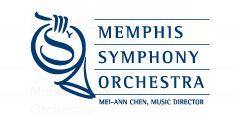
In case you haven’t heard already the Memphis Symphony Orchestra is running out of money. The endowment has dried up and the sky is falling. Or maybe the sky is merely restructuring, depending on the account you believe. In either case, unless someone can convince me otherwise, the word “dire” seems appropriate.
A recent gift of $100,000 will prop up the MSO in the short term but the 2013-14 shortfall is closer to $400,000, and barring a much larger cash infusion hard decisions will have to be made sooner rather that later. While not desirable obviously, worst case outcomes can’t be completely dismissed. This shouldn’t be surprising news given the challenges orchestras playing all the hits of the 18th and 19th-Centuries face in 21st-Century America, but it’s especially disconcerting given the MSO’s high level of artistic achievement, innovation and audience engagement.
The local news has broken on the heels of a critical dustup and Internet skirmish between Slate’s Mark Vanhoenacker who recently wrote that things were looking bad for classical music and the New Yorker’s William Robin who passionately disputed Vanhoenacker’s muddled but still compelling math.
Both of the above-mentioned accounts are a little obnoxious. One uses truly ugly numbers that never quite add up to its hackneyed conclusions about fat ladies and song. The other, leaning too much on this grumpy blog post for support, is nothing more than extremely serious cheerleading. Taken together, however, these pieces do point us in the direction of a dialogue we need to have, employing more civil and less sensational terms.
What’s especially disquieting is that in Memphis classical music has been winning. Although the “Memphis model” has been widely misunderstood, the MSO has been having this conversation with itself for a long time. Right here in River City the MSO’s artistic and administrative leadership joined forces in unprecedented ways, with the full understanding that the fate of modern orchestras has less to do with the quality or importance of classical music, than the bond of reciprocity created between the orchestra and the community it serves.
By building unique community partnerships the MSO attracted unlikely donors and unusual grants. With some new cash streams, innovative community engagement projects like Leading from Every Chair, and Opus One it looked like Memphis was well on its way to finding a sustainable way forward.
“The Memphis Symphony has not yet achieved long-term financial stability,” Ryan Fleur, the former MSO CEO said in a Feburary, 2011 interview with polyphonic.org, an online forum for orchestra musicians.
“By doing all these things we’re still in business and we have a path to success,” Fleur added. “We’ve captured the imagination and attention of a much wider circle of Memphians who will ultimately help us change our own business model. Now we’re in lag time — in the business world it takes 5 years before you find the full revenue return on an investment.”
Although the country was mired in economic crisis and the MSO had been forced to slash its budget the ink was black and there were reasons for Fleur to be optimistic. For the fiscal year starting July 1, 2010 and ending June 30, 2011 the orchestra took in $4,722,614 with expenses reported at $4,610,653.
Three years after Fleur made the case for his five-year plan much has changed, at least on the surface. He’s an Executive Vice President with the Philadelphia Orchestra. Former COO Lisa Dixon is Executive director of the Portland Symphony, innovative concert master Susannah Perry Gilmore has joined the Omaha Symphony, and Memphis is in crisis.
In an admittedly dated promotional video MSO board member Dan Poag broke down some numbers that are worth chewing on still, especially in light of the stats collected in the much- vilified Slate article . The average ticket price, he explained, covered only 30% of what it actually costs to produce MSO concerts. The other 70% — a subsidy for MSO ticket holders — comes in the form of sponsorships, gifts, and grants.
Inside the MSO
Roland Valliere, the new no-nonsense CEO of the Memphis Symphony Orchestra has a reputation for salvaging seemingly doomed orchestras. With austerity measures and outsourcing he was able to prop up the Columbus Symphony Orchestra in Columbus, Ohio. The message he is currently sending Memphians is clear: When this season ends, things are changing.
Not so very long ago the MSO seemed to have momentum. It was trying new things, reaching new audiences by way of Opus One, and cultivating a reputation for dynamic live performances under Mei Ann Chen’s baton. Although the path forward was always uncertain, the organization was clearly energized, engaged, and positioned to develop new revenue streams while attracting new donors. So what happened to all of that potential? Or what didn’t happen?
Among other near-term changes an Opus One concert scheduled for March has been cancelled. The concert would have paired the MSO with the best of Memphis’ singer-songwriters. I bring this up because it’s sad, obviously, but also because there’s one more question worth asking, and nobody has ever asked it better than Memphis rapper Al Kapone, on the electric night when he shared the stage with Opus One: “What about the music?”
Well, what about it?